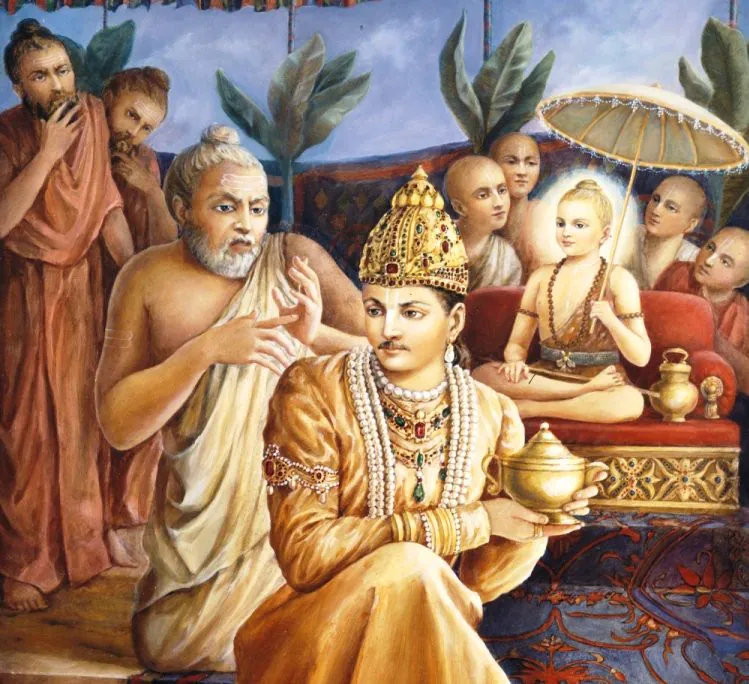The incarnation of Lord Vamanadeva holds a pivotal place in the Śrīmad Bhāgavatam. Appearing in the Eighth Canto, Chapters 18-22, this divine pastime reveals the Lord’s plan to restore cosmic order by incarnating as a humble dwarf brahmachari to vanquish the pride of Bali Maharaja. As we approach Vamana Dvadasi, devotees commemorate this event by fasting and engaging in special prayers and services. Lord Vamanadeva, though appearing in a diminutive form, displays His vast power and grace by reclaiming the universe, all while teaching profound lessons on humility, surrender, and devotion .
Reason Behind Vamana’s Appearance: The background of Lord Vamana’s incarnation is intertwined with the welfare of the demigods and the cosmic balance. Bali Maharaja, a descendant of the great devotee Prahlada Maharaja, had gained immense power and dominion over the universe, causing distress to Indra and the other demigods. Despite his virtuous qualities, Bali’s increasing influence threatened to upend the established order.
Aditi, the mother of the demigods, sought the Lord’s intervention to protect her sons and return their rightful dominion. She performed the payovrata, a rigorous penance, as instructed by her husband Kashyapa Muni. Her deep devotion pleased Lord Krishna, who incarnated as her son Vamana, promising to help the demigods regain their position. Thus, the Lord appeared not just to defeat Bali Maharaja but to restore harmony and uphold righteousness .
The Vamanadeva pastime teaches profound lessons in humility, devotion, and surrender. It illustrates how the Lord intervenes not to punish, but to uplift and glorify His devotees.
Elaborate Description of the Pastime: The actual pastime of Vamanadeva is as profound as it is visually captivating. The scene is set during a grand yajna (sacrifice) organized by Bali Maharaja. Vamanadeva, disguised as a dwarf brahmachari, entered the sacrificial arena. His divine effulgence immediately captivated all present, including the sages, Bali Maharaja, and even the demigods.
Vamanadeva requested three paces of land, a seemingly humble and insignificant request. However, as soon as Bali Maharaja granted the request, the Lord expanded His form to cover the entire universe. With His first step, He covered the entire earth. With His second step, He covered the heavens. The Lord then asked Bali where He should place His third step, as there was no more land to cover .
At this moment, Bali Maharaja realized the divine nature of Vamanadeva and, without hesitation, offered his own head for the Lord’s third step. This act symbolized Bali Maharaja’s complete surrender to the Lord, demonstrating his unwavering devotion and humility .
Bali Maharaja’s Test and Devotion: Bali Maharaja was tested not just in his role as a king but in his capacity as a devotee. Despite being warned by his spiritual master, Sukracharya, to retract his promise, Bali chose to honor his word. In doing so, he passed the ultimate test of devotion—surrendering everything to the Supreme Lord, even at the cost of his kingdom and material possessions.
This act of surrender reflects the highest level of devotion and sacrifice. Instead of clinging to his material wealth and position, Bali Maharaja chose to offer everything to the Lord, including himself. His willingness to offer his head for the Lord’s third step exemplifies the surrender that Lord Krishna seeks from His devotees—full and unconditional .
Vamanadeva’s actions, while appearing to cause the conflict, were ultimately aimed at resolving it on a higher spiritual platform
Specific Qualities Exhibited by Bali Maharaja: Throughout this pastime, Bali Maharaja displayed several key qualities that highlight his greatness as a devotee:
1. Generosity: Bali Maharaja’s charitable nature is evident when he unhesitatingly agrees to Vamanadeva’s request for three paces of land, despite knowing that it might mean losing everything.
2. Surrender: By offering his head for the Lord’s third step, Bali demonstrates the highest level of surrender, showing that nothing, not even one’s life, should be withheld from the Lord.
3. Devotional Integrity: Despite his spiritual master’s advice to deny Vamanadeva’s request, Bali Maharaja chose to maintain his vow, demonstrating his unwavering faith in the Lord.
4. Humility: Bali Maharaja’s humility in surrendering to the Lord, even after losing his kingdom, is a lesson for all devotees .
Significance of the Pastime: The Vamanadeva pastime teaches profound lessons in humility, devotion, and surrender. It illustrates how the Lord intervenes not to punish, but to uplift and glorify His devotees. In the case of Bali Maharaja, despite losing his kingdom, he gained the Lord’s eternal protection and was blessed with the opportunity to serve Him eternally. This underscores the point that material losses are insignificant when compared to spiritual gains.
Moreover, this pastime reveals the Lord’s compassion and cleverness. By taking the form of a dwarf, Vamanadeva accomplished a monumental task without resorting to violence or destruction. His divine intelligence ensured that Bali was not humiliated but rather glorified for his devotion .

The Conflict Between Sukracharya and Bali Maharaja
Sukracharya, Bali Maharaja’s spiritual master, opposed his disciple’s decision to grant Vamanadeva’s request. He warned Bali that fulfilling the promise would lead to the loss of his kingdom and material wealth. Sukracharya’s concerns were rooted in material considerations, fearing that Bali’s future would be bleak if he lost his dominion.
This created a significant conflict between the disciple and the guru. Sukracharya even cursed Bali Maharaja for defying his advice. However, Bali Maharaja remained steadfast, choosing to honor his promise to the Lord above all else. This moment signifies a crucial aspect of devotion—prioritizing the Supreme Lord’s will even when it challenges other relationships or material security.
Vamanadeva as the Supreme Conflict Resolver
Vamanadeva’s actions, while appearing to cause the conflict, were ultimately aimed at resolving it on a higher spiritual platform. After Bali Maharaja surrendered, Vamanadeva bound him with the ropes of Varuna and sent him to the lower planetary system, Patala Loka. Despite the apparent loss, the Lord was pleased with Bali’s devotion and granted him sovereignty over Sutala, a realm more opulent than the heavens.
Through this act, Vamanadeva reconciled the apparent conflict between Bali Maharaja and Sukracharya. By rewarding Bali’s devotion, the Lord demonstrated that surrender to Him leads to a greater reward than any material gain. Sukracharya eventually recognized the Lord’s plan, understanding that Bali’s surrender had brought him far more than he had lost.
Sukracharya’s acceptance of Vamanadeva’s plan illustrates a profound transformation. He moved from a position of opposition to a place of understanding and reverence. This shift underscores a vital lesson in spiritual life: the supremacy of the Lord’s will. Even great sages can momentarily fall prey to material considerations, but the Lord, in His compassion, guides them back to the path of truth and devotion. Sukracharya’s eventual recognition of Vamanadeva’s glory and the divine arrangement He orchestrated highlights the Lord’s role in resolving misunderstandings and leading everyone involved to a higher state of spiritual consciousness

Vamanadeva as the Supreme Conflict Resolver
- Humility Over Pride: Even when we achieve great material success, it is vital to remain humble. Bali Maharaja, though the ruler of the three worlds, bowed before the Lord and surrendered everything.
- The Importance of Surrender: True surrender means giving everything—our wealth, position, and even our ego—to the Lord. Bali Maharaja exemplifies this ultimate act of surrender.
- Trust in the Lord’s Plan: Bali Maharaja’s unwavering trust in the Lord, even when he was stripped of all his possessions, teaches us to have faith in Krishna’s plan for us.
- Detachment from Material Possessions: This pastime reminds us that material possessions are temporary and can be lost at any moment. The true treasure lies in our relationship with the Lord.
Application in Our Lives: We can apply the lessons from this divine pastime by practicing humility in our day-to-day lives, especially in situations where we may feel proud or attached to material success. Like Bali Maharaja, we can learn to trust the Lord’s plan, even when it seems difficult or contrary to our desires. By surrendering our lives to Krishna, we align ourselves with His divine will and open the door to spiritual progress .
By taking the form of a dwarf, Vamanadeva accomplished a monumental task without resorting to violence or destruction.
Fasting on Vamana Dvadasi in ISKCON: In ISKCON, devotees observe a specific fasting protocol in honor of Vamanadeva. The fasting is observed on Ekadashi, the day before Vamana Dvadasi. On this day, devotees typically fast completely until noon to honor Lord Vamanadeva, refraining not only from grains and beans (as per standard Ekadashi observance) but also abstaining from even anukalpa (Ekadashi prasadam such as fruits or nuts).
The reason for fasting on Ekadashi instead of Dvadasi is that fasting on the Dvadasi day itself is not considered suitable according to the Vaishnava calendar. Thus, devotees maintain the fast until noon on Ekadashi, then break it with offerings of prasadam after their devotional practices, particularly reading or hearing the Śrīmad Bhāgavatam account of Vamanadeva’s appearance. On Vamana Dvadasi, the devotees may partake in a normal prasadam meal, having completed their fast the previous day.
Vamana Dvadasi is a sacred day in the Vaishnava calendar, reminding us of Lord Krishna’s divine intervention in the affairs of the universe. Through the pastime of Vamanadeva and Bali Maharaja, we learn the importance of humility, surrender, and faith in the Lord’s will. As we fast and meditate on this divine story, may we pray for the strength to surrender our pride, detach from material desires, and fully embrace the path of devotion. In doing so, we can draw closer to the Lord and become instruments of His divine will.
A small contribution on this Vamana Dvadasi in form of Vamana Seva to contribute towards construction of ISKCON Whitefield temple, will garner large spiritual credits.
Hare Rama Hare Rama Rama Rama Hare Hare








